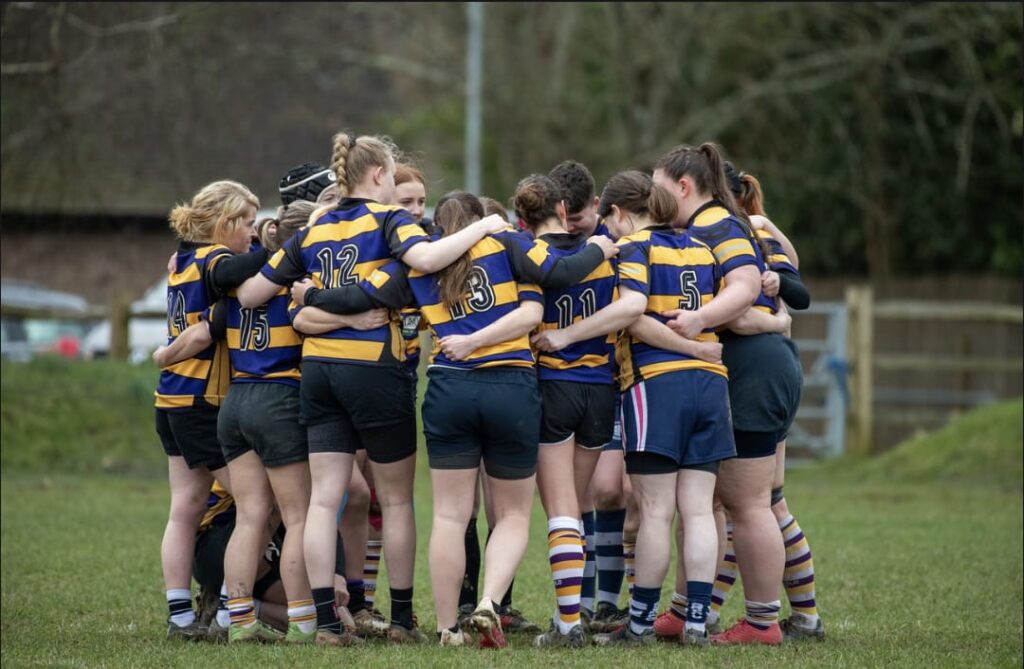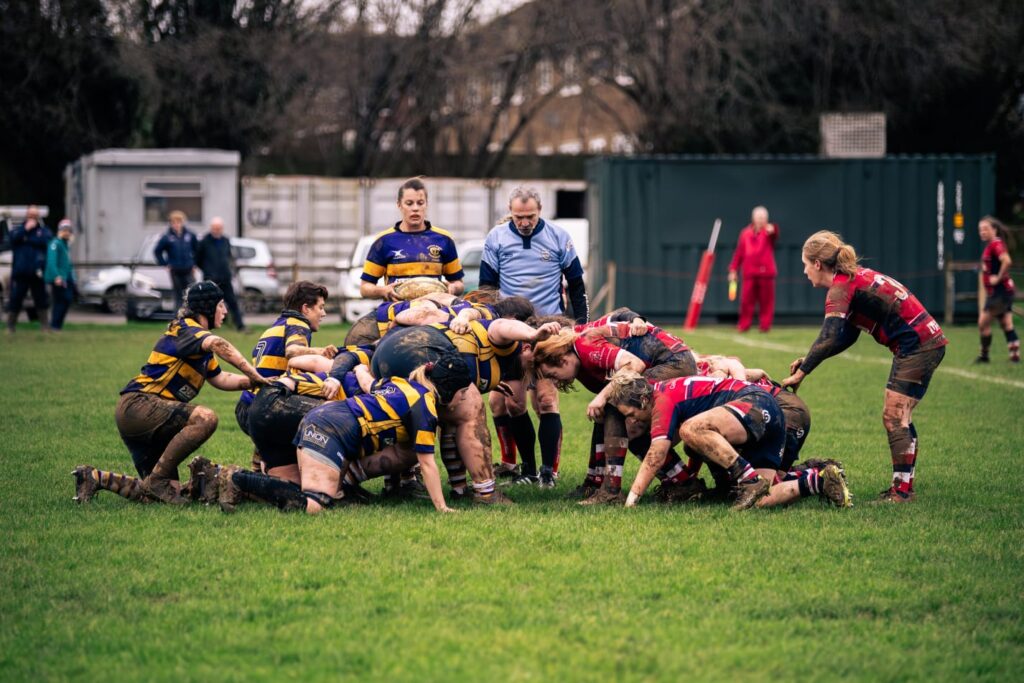As the Women’s Rugby World Cup approaches, there is hope for a swell of participation in the game – but that won’t happen on its own. It takes the dedication of grassroots volunteers, as Amy Hamerslagh and Cerys Jones report.
When the Women’s Rugby World Cup takes over England this summer, volunteers like Megan Hogg and Molly Byford will be buzzing with excitement to cheer on the Red Roses from Sunderland to Brighton. For them, this is far more than a set of games; it’s a celebration of women’s rugby and hope for what the future holds.
Looking back to when England hosted the women’s European Championships in football in 2022, it’s clear the impact that a home tournament can have on grassroots participation in women’s sport. The Football Association say that from 2020-2024, the number of women and girls playing football in the UK increased by 56%. It begs the question of whether this summer’s tournament could have a transformative effect on women’s rugby in the UK.

The work of grassroots clubs
The star power of women’s rugby has certainly grown, best exemplified by Ilona Maher. The American is the world’s most followed rugby player on social media and her arrival at Bristol Bears earlier this year sparked unprecedented demand for tickets, leading to a new Premiership Women’s Rugby record attendance of 9,240 at her first game. Maher’s arrival has shone a spotlight on the league, and with affordable tickets for this summer’s tournament, there is hope the crowds will come.
Megan is a social media officer and committee member at East London Rugby Club. They understand that this is a crucial opportunity to boost visibility, describing the chance for young girls to come and watch their heroes at low prices as “invaluable”.
However, behind the star players, a huge amount of work has to go in on the ground to ensure interest in the elite sport results in growth at grassroots.
“I think most of grassroots rugby is run by volunteers. I do this entirely voluntarily, our entire club is basically voluntary, so it ends up becoming your whole life outside of your full-time job,” says Megan.
Megan says: “A lot of people will show up to a training session and not think about, you know, someone had to buy the kit, someone had to rent the space, someone has to be the coach on a match day, someone has to make sure that everything gets brought along and someone has to pull together the team sheet, – it’s things like that where you kind of don’t realise that so many people have facilitated the team being able to do what they love at the weekend.”

Molly is captain of Uckfield RFC and an equality, diversity and inclusion lead. At her club, volunteers juggle a huge amount. One woman steps in as captain sometimes, works behind the bar, and cooks the food after games when she needs to – all alongside a full-time job as a mental health nurse.
She points out that there can also be additional barriers to women getting involved in grassroots sport. “We tend to draw a lot of women who are over-committed in lots of forms of their life, whether they’re single parents or organising childcare. Its tricky – I see a lot of men’s teams (where) their whole life is that rugby club, but it’s harder to find women who have their whole lives to dedicate to a rugby club.
For example she says that if a men’s rugby team goes on tour, “if any of them have kids, their partners have probably stepped in and looked after them. It’s a completely different ballgame.”
Yet the team’s dedication to the sport demonstrates their commitment to providing opportunities for players to enjoy the sport they love.
Megan explains how East London Rugby Club run initiatives like their ‘Pathway to Rugby’ programme, which starts with try rugby days and turns into a course with a direct pipeline to the women’s team. They are also planning recruitment initiatives around the World Cup as well as watch parties and even a team trip to watch one of the matches.
Why investment matters
Dedication and passion alone, while key ingredients, aren’t enough. There are still shortcomings at grassroots level – for example, Molly explains that her team don’t have a physio provided and often have to get treated by the opposition’s physio if needed. It speaks to the need, ultimately, for investment.
“If women’s rugby historically had been left to (grow organically) we just wouldn’t be where we’re at now. It takes a huge amount of investment.
“To just think that you can sit back and let the women’s game blossom without men higher up in the game championing you, and bringing it up to the same level, then that’s just not going to happen.
“There has to be investment.”
The role of the RFU and beyond
The Rugby Football Union (RFU) has launched guidance for clubs across the country, aiming to capitalise on the World Cup, such as hosting watch parties and maximising their use of social media.
When asked what else the RFU could do to support clubs, Megan tells Sidelines: “We would obviously always love more resources for the grassroots game… but it’s always been about funding.”
“It’s not cheap to set up a rugby team. The kit involved can be quite extensive, you need a physio, things like that. So it’d be really nice if the World Cup was an opportunity for them to say: ‘Actually, you know, here’s some funding, here’s some guidance, here’s some support on bringing certain roles into your organisation and things like that.'”
Megan adds that more support around inclusion would also be welcome: “Quite often, we find that participation in rugby is a certain type of person. There are cost implications, so you don’t always get those people on the working-class spectrum. Also, being queer in rugby is not always the nicest thing.”
Rugby is still a sport with safety concerns and social stereotypes that it’s not suitable for girls. Dedicated investment to address these challenges could make a difference.
This opportunity for the UK to host the tournament can serve as a catalyst to inspire the younger generation and break down stereotypes about women belonging in the sport. With affordable tickets and promoting the event, it aims to attract new players and fans. With star players like Illona Maher and the Red Roses’ Ellie Kildunne, it will enable the sports marketability and appeal to reach beyond traditional audiences.
Out of the limelight, grassroots clubs like Uckfield and the East London Rugby Club, are tirelessly working to ensure this World Cup is a vital stepping stone in making rugby an accessible sport for women and girls across the UK. Impact ’25, the legacy programme for the tournament, will see £12.13m of government funding invested into women’s rugby across England and the home unions. It’s the sort of proactive change that will be needed to push the sport on.
“There’s no way that we can just sit and hope it gets better, because that’s not how it’s changed in the past. I don’t think the first set of England women who got contracts just sat there hoping for it. It took a lot of work,” says Molly.
Sidelines Recommends

The Saudi sport revolution
In 2018 Saudi Arabia entered the global sporting spotlight, spending billions to bring top competitions to their homeland. Sidelines looks at the events, how it is all possible and the reaction from around the world. The first-ever Formula E race in Diriyah, 2018, was…

The falconers: protectors of the pitch
Sidelines explores how some of sport’s little-known avian art – falconry – helps get sports venues ready for action.High above the pitch, before a single whistle blows or a seat is filled, the real warm-up act begins. A hawk slices through the early morning air,…

Going the extra mile: journalist away days
Work trips as a sports journalist surely beat most UK corporate away days – but they’re not all glitz and glamour! Learn what it’s like to cover sporting events around the world…




